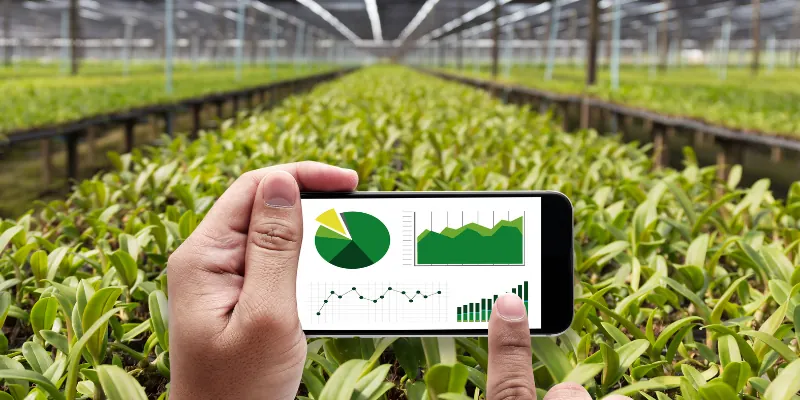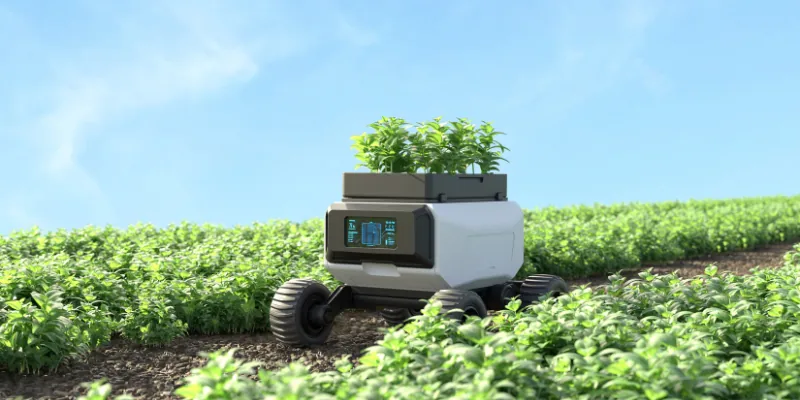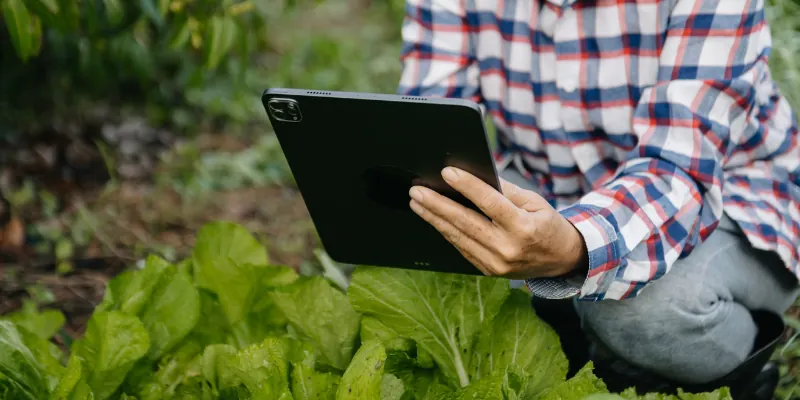Advantages of Computer in Agriculture for Smart Farming
Published: 16 Feb 2025
Computers have revolutionized many industries, and agriculture is no exception. Today, farmers are using advanced technologies like GPS systems, drones, and automated machinery to increase efficiency and productivity. With the help of computers, farmers can track weather patterns, monitor soil health, and even predict crop yields. The integration of computers in farming is no longer a luxury, it’s becoming a necessity for those looking to stay competitive in the modern agricultural world. Let’s explore the key advantages of computer in agriculture:
Efficiency and Productivity
Computers help farmers work faster and smarter. With automation and data analysis, tasks like planting, harvesting, and monitoring crops become more efficient. This saves time, reduces labor, and improves overall productivity.
- Computers speed up farming tasks and reduce manual effort.
- Automated systems help in sowing, watering, and harvesting crops.
- Farmers can track crop growth without visiting the fields.
- Data analysis helps in making better farming decisions.
- Weather and soil condition monitoring improve planning.
- Smart farming reduces the chances of human errors.
- Drones and sensors provide real-time information on crops.
- Automated irrigation ensures plants get the right amount of water.
- Less time spent on manual labor means more focus on farm management.
- Higher efficiency leads to better yields and increased profits.

Precision Farming
Precision farming helps farmers use water, fertilizers, and pesticides efficiently. Computers analyze data to determine where resources are needed most. This reduces waste and improves crop health.
- Sensors monitor soil moisture and nutrient levels.
- GPS-guided machines ensure accurate planting and spraying.
- Farmers apply fertilizers only where needed, saving money.
- Drones capture images to detect unhealthy plants.
- Smart technology prevents overuse of water and chemicals.
- Reduces environmental impact by using fewer chemicals.
- Helps in growing healthier crops with fewer resources.
- Predictive analysis improves planning for better results.
- Ensures every part of the field gets proper care.
- Saves money while increasing production quality.
Automated Machinery
Farming machines powered by computers make agriculture easier and more efficient. Smart irrigation systems help manage water usage effectively. These technologies reduce manual work and improve productivity.
- Self-driving tractors help in plowing and planting seeds.
- Drones spray pesticides and fertilizers with precision.
- Irrigation sensors monitor soil moisture levels.
- Farmers can control irrigation systems remotely.
- Smart systems prevent overwatering and underwatering.
- Saves water and energy while ensuring healthy crops.
- Reduces dependency on manual labor.
- Improves crop growth with consistent water supply.
- Enhances farming efficiency, especially in large farms.
- Leads to better yields with less effort.

Crop Monitoring
Computers help farmers keep track of their crops without walking through the fields. Sensors and drones provide real-time updates about plant health. This helps in early disease detection and timely action.
- Drones capture high-resolution images of fields.
- AI analyzes crop health and detects diseases early.
- Sensors track soil conditions and temperature.
- Early detection prevents disease from spreading.
- Farmers can act fast to save crops from damage.
- Reduces losses by preventing major outbreaks.
- Ensures only healthy crops reach the market.
- Increases overall yield quality and quantity.
- Saves money on unnecessary pesticide use.
- Keeps farms productive and sustainable.

Weather Forecasting
Weather is a big factor in farming success. Computers analyze weather patterns and provide accurate forecasts. This helps farmers plan their activities better.
- Farmers receive early warnings about storms and droughts.
- Helps in deciding the best time to plant and harvest.
- Reduces crop damage from unexpected weather changes.
- Satellite data improves long-term weather predictions.
- Prevents overwatering or underwatering due to rain forecasts.
- Saves resources by avoiding unnecessary irrigation.
- Allows better planning of farm activities.
- Helps protect crops from frost and heatwaves.
- Reduces risks associated with climate change.
- Increases farm productivity and profitability.
Soil Analysis
Healthy soil is the foundation of good farming. Computers analyze soil nutrients and suggest the best fertilizers. This helps in maintaining soil fertility and increasing yields.
- Sensors check soil moisture and nutrient levels.
- AI recommends the right type and amount of fertilizers.
- Farmers avoid overusing chemicals, protecting soil health.
- Better soil leads to stronger and healthier plants.
- Reduces costs by using only the required fertilizers.
- Prevents soil depletion and maintains long-term fertility.
- Smart soil mapping helps in better field management.
- Increases efficiency in fertilizer application.
- Ensures balanced nutrient distribution across fields.
- Leads to consistent and improved crop production.

Reduced Labor Costs
Automation reduces the need for extra workers on farms. Machines and computers perform repetitive tasks quickly and accurately. This lowers costs and increases profits.
- Automated tractors reduce the need for human drivers.
- Robotic systems help with planting and harvesting.
- Reduces labor expenses for small and large farms.
- Smart irrigation systems operate without manual effort.
- Fewer workers needed for monitoring crops.
- Increases efficiency in farm operations.
- Farmers save money on wages and manual labor.
- Reduces physical workload for farmers.
- Allows focus on improving other areas of farming.
- Leads to better farm management and higher profits.
Data-Driven Decisions
Farmers make better choices when they have the right information. Computers collect and analyze data from soil, weather, and crops. This helps in making smarter farming decisions.
- Weather data helps in scheduling farming activities.
- Soil data determines the best planting time.
- Crop monitoring helps identify problems early.
- Automated reports provide useful insights for farmers.
- Reduces guesswork in farming practices.
- Helps in planning irrigation and fertilization.
- Leads to more efficient use of farm resources.
- Improves crop quality and yield.
- Reduces waste of seeds, water, and fertilizers.
- Enhances profitability through smarter strategies.
Supply Chain
Computers help farmers track and manage their resources. They ensure that seeds, fertilizers, and equipment are available when needed. This prevents shortages and improves farm operations.
- Keeps records of available farm supplies.
- Helps in ordering materials on time.
- Prevents wastage and overstocking.
- Reduces losses due to expired or unused items.
- Ensures smooth farm operations.
- Improves financial planning for farmers.
- Helps in tracking product demand and supply.
- Reduces dependency on manual record-keeping.
- Enhances overall farm organization.
- Saves time and increases productivity.

Market Access
Farmers can sell their products online with the help of computers. Digital platforms help them reach more customers and get better prices. This increases their income and business growth.
- Farmers can list their products on online marketplaces.
- Helps in finding buyers without middlemen.
- Increases profits by selling directly to customers.
- Social media helps in promoting farm products.
- E-commerce platforms improve business opportunities.
- Farmers can track prices and demand in real time.
- Ensures fair pricing for their produce.
- Expands market reach beyond local areas.
- Provides access to global buyers.
- Leads to more stable and profitable farming.
Computers allow farmers to monitor crops, automate tasks, and analyze data for better decision-making. They help with precision farming, ensuring that water, fertilizers, and pesticides are used efficiently. This leads to higher yields and lower costs.
Not all farming technology is expensive. There are budget-friendly options like mobile apps, GPS tools, and free farm management software. Small farmers can start with basic tools and upgrade as needed.
Precision farming uses technology like GPS, sensors, and data analysis to optimize farming practices. It ensures that resources like water and fertilizers are used exactly where needed. This reduces waste and improves crop growth.
Yes! With the help of sensors, drones, and AI, computers can analyze plant health and detect diseases early. This allows farmers to take action before the disease spreads, saving crops and increasing yields.
Farmers use software for weather forecasting, crop monitoring, inventory management, and financial tracking. Examples include farm management apps, irrigation control systems, and satellite imaging tools. These help in making data-driven decisions for better farming.
Smart irrigation systems use sensors and weather data to determine when and how much water crops need. This prevents overwatering and saves water while keeping plants healthy. Farmers can even control irrigation remotely using their smartphones or computers.
Not necessarily! Many modern farming tools are user-friendly and come with simple instructions. Farmers can also take short online courses or workshops to learn how to use technology effectively.
Yes! Farmers use computer systems to track animal health, feeding schedules, and breeding cycles. This helps improve animal welfare and increases productivity on livestock farms.
Computers help farmers connect with buyers online through e-commerce platforms and digital marketplaces. They can track demand, set competitive prices, and even market their products on social media. This expands their customer base and increases profits.
The future looks promising, with AI, robotics, and big data playing bigger roles in farming. Smart farms will rely on automation, drones, and self-driving tractors to increase efficiency. As technology advances, agriculture will become even more sustainable and productive.
Conclusion:
So guys, in this article, we’ve covered the advantages of computers in agriculture in detail. Computers are helping farmers tackle challenges and increase productivity like never before. Personally, I recommend that you don’t be intimidated by the idea of using technology, start with basic tools and build from there. The sooner you embrace these technologies, the sooner you’ll see the benefits. So, why not take action today and explore how computers can help your farm grow? The future of agriculture is in your hands!

- Be Respectful
- Stay Relevant
- Stay Positive
- True Feedback
- Encourage Discussion
- Avoid Spamming
- No Fake News
- Don't Copy-Paste
- No Personal Attacks

- Be Respectful
- Stay Relevant
- Stay Positive
- True Feedback
- Encourage Discussion
- Avoid Spamming
- No Fake News
- Don't Copy-Paste
- No Personal Attacks
